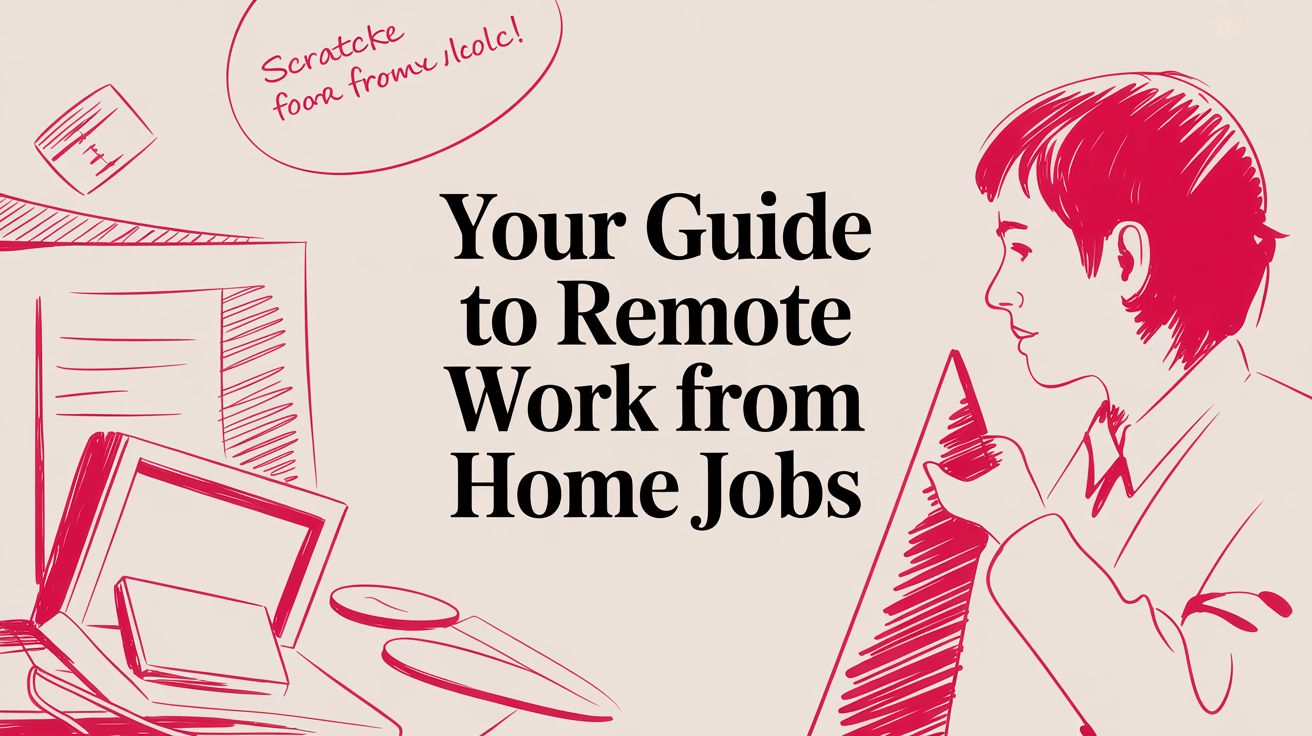Let’s get one thing straight: legitimate work-from-home jobs are not a myth. They’re a real, thriving part of the modern economy. The trick isn’t finding them—it’s knowing what a genuine opportunity looks like and how to sidestep the scams.
The New Reality of Working Remotely
Think of the remote job market like a city that exploded overnight. Just a few years ago, it was a quiet town with a handful of niche roles. Today, it’s a sprawling metropolis packed with careers in every field you can imagine, from tech and finance to creative and customer support roles.
This guide is your map through that city. We’re here to show you what a legitimate remote job actually is: a real position with a real company that offers fair pay, benefits, and a path for growth—not just some flimsy side hustle. Our goal is to arm you with the confidence and the practical tools to navigate this new world. To really dig into the different paths you can take, it’s worth checking out a complete success guide on how to get a remote job.
The Shift to a Remote-First World
The move to widespread remote work happened faster than anyone could have guessed. Before 2020, these setups felt like a rare perk. Back in 2019, only about 6.5% of private-sector workers were primarily working from home.
But then, everything changed. By 2021, some industries saw that number jump by over 30 percentage points. Remote work is no longer a temporary fix; for many companies and employees, it’s the new standard.
This isn’t just about convenience; it reflects a massive shift in what people value in their careers. Flexibility has become a top priority, sometimes even more than the paycheck.
A recent study found that a staggering 81% of workers in the U.S. now see remote work as the single most important factor in a job—placing it even higher than salary.
This tells us that finding a solid work-from-home role is more than just a nice-to-have. It’s a core piece of building a satisfying, modern career. With the right approach, you can absolutely find a position that fits your life and your ambitions.
How to Spot Scams and Find Real Opportunities

Navigating the remote job market can sometimes feel like walking through a minefield. For every genuine career opportunity, there’s a cleverly disguised trap waiting for an unsuspecting applicant. The real key to landing a legitimate work-from-home job is learning to think like a detective, spotting the subtle clues that separate a real offer from a total scam.
It’s all about recognizing the patterns. Scammers thrive on creating a sense of urgency and dangling the promise of easy money, while legitimate companies follow structured, professional hiring processes. Once you learn the difference, you can confidently filter out the noise and zero in on the roles that will actually move your career forward.
Common Red Flags of a Job Scam
Think of these as bright, flashing warning signs. If you encounter one or more of them in a job posting or during an “interview,” it’s time to hit the brakes and proceed with extreme caution—or just walk away.
- Requests for Payment: This is the big one. A real employer will never ask you to pay for training, company software, or a background check. A common scam involves sending you a fake check to buy “equipment,” then asking you to deposit it and wire back the “extra” funds before the check bounces.
- Vague Job Descriptions: If a posting promises incredible pay for very little work and is suspiciously light on specific duties, qualifications, or company details, run. Real jobs have clear, defined expectations and requirements.
- Unprofessional Communication: Keep an eye out for emails coming from personal addresses (like Gmail or Yahoo) instead of a corporate domain. Poor grammar, typos, excessive urgency (“You must accept today!”), and interviews conducted only over text or instant messenger are all classic signs of a scam.
Job scams aren’t just an annoyance; they’re costly. Scammers are often trying to steal your personal information for identity theft or trick you into sending them money directly. Never, ever share your bank account details or social security number until you have thoroughly verified a company is the real deal.
Green Flags of a Legitimate Opportunity
On the flip side, legitimate companies leave a trail of positive evidence. These “green flags” are signs that you’re dealing with a professional, trustworthy organization.
A verifiable online presence is the very first thing to check. Does the company have a professional website? An active LinkedIn page with real, identifiable employees? What about reviews on sites like Glassdoor? This digital footprint is hard to fake and is a great indicator of an established company.
Next, pay close attention to the hiring process itself. A real company will have a structured interview process, often involving multiple rounds with different team members. They’ll ask you thoughtful questions about your skills and experience, and they will be transparent about salary, benefits, and what the job really entails.
For a deeper dive into effective job-hunting strategies, our guide on how to find remote jobs offers more tactics for locating and securing quality positions.
Finally, a legitimate job offer will always be presented in a formal document. This written offer will clearly detail your role, compensation package, and start date. It gives you an official record of your employment terms, protecting both you and the employer. By keeping an eye out for these positive signals, you can confidently identify and pursue the authentic, rewarding remote career you’re looking for.
Red Flags vs Green Flags in Remote Job Listings
Here’s a quick-glance table to help you instantly spot the difference between a potential scam and a promising opportunity.
| Red Flag (Potential Scam) | Green Flag (Likely Legitimate) |
|---|---|
| Asks for money for training or equipment. | No fees required. The company provides necessary tools or a stipend. |
| Vague job duties with unusually high pay. | Detailed job description with clear responsibilities and qualifications. |
| Communication is unprofessional (typos, grammar errors). | Professional, error-free communication from a corporate email address. |
| Interview is conducted only via text or chat messenger. | Multi-stage interview process, often including video calls with the team. |
| Creates intense pressure to accept the offer immediately. | A formal written offer is provided with reasonable time for consideration. |
| No verifiable online presence (no website, no LinkedIn). | A strong online presence with a professional website and employee profiles. |
Think of this table as your field guide. Having these points in mind will make it much easier to separate the legitimate roles from the time-wasters and focus your energy where it counts.
Exploring Top Fields for Remote Careers

Alright, so you know how to spot a real opportunity from a scam. What’s next? Figuring out where to actually look.
The world of legitimate work-from-home jobs has blown up, going way beyond the old-school data entry or call center gigs. These days, entire high-paying industries have gone remote, creating amazing career paths that offer both flexibility and real room for growth.
Think of this section as your personal career fair. We’re going to tour some of the hottest fields where remote work isn’t just a perk—it’s the norm. Knowing where the action is will help you see where your current skills might fit or what new ones could kickstart a killer remote career.
Technology and Development
Let’s start with the OG of remote work: the tech industry. For roles like software engineers, cybersecurity pros, and web developers, working from anywhere is old news. Their jobs are built around digital tools and collaboration, so a physical office was never really that important.
For example, a software developer’s day is all about writing code, hopping on Slack to collaborate with a team that could be spread across continents, and using project management tools to push updates. What matters is the quality of their code, not where their desk is located.
- Common Job Titles: Software Engineer, Cybersecurity Analyst, Full-Stack Developer, DevOps Engineer.
- Essential Skills: Knowing your way around programming languages like Python or JavaScript, familiarity with cloud platforms (AWS, Azure), and solid problem-solving skills.
- Why It Works Remotely: The work is project-based and can be done from any laptop with a decent internet connection. It’s a perfect fit for a team that isn’t always online at the same time.
The hunger for tech talent is off the charts. Companies are in a constant battle for the best people, and offering fully remote positions lets them fish from a much bigger pond. This gives skilled candidates a serious advantage.
Creative and Design Services
The creative world has also fully embraced the remote-first lifestyle. Whether it’s writing killer website copy or designing an app that’s a joy to use, these jobs are all about creativity and big-picture thinking. Content strategists, UX/UI designers, and graphic designers often do their best work when they can tune out the office buzz.
A UX designer might spend their morning on remote user research calls, then spend the afternoon building wireframes in a tool like Figma, and end the day presenting designs to clients over a video call. The whole process is digital from start to finish.
Business and Marketing Operations
So many of the core jobs that keep a business running can now be done from home. Think about digital marketing, project management, and even human resources—these fields are packed with legitimate remote opportunities. These are the people who make sure projects get done and teams run like a well-oiled machine.
A digital marketing manager, for instance, can run ad campaigns across the globe, dive into performance data, and coordinate with freelance writers and designers, all from their home office. The tools they rely on—like Google Analytics and social media schedulers—are all in the cloud.
Our guide on the top remote working jobs dives even deeper into these kinds of exciting roles.
- Common Job Titles: Project Manager, Digital Marketing Specialist, SEO Analyst, Remote Recruiter.
- Essential Skills: Being super organized, a great communicator, and comfortable with collaboration software like Asana, Trello, or Slack.
- Why It Works Remotely: These roles are all about managing processes, people, and information—all things that modern digital tools handle beautifully.
Where to Find Vetted Remote Job Boards
Knowing which fields are ripe with opportunity is just the first piece of the puzzle. The next, and arguably more important, step is figuring out where to find these legitimate work-from-home jobs without getting lost in the scams that flood generic job sites. The right platform is like a filter, serving up vetted, high-quality roles so you can spend your time on applications, not detective work.
Think of your job search like fishing. You could cast a huge net into a massive, murky ocean and just hope for the best. Or, you could head to a well-stocked, clear lake where you know the good fish are biting. Specialized remote job boards are that clear lake.
Specialized Remote-First Platforms
The best place to kick off your search is on platforms built from the ground up for remote work. For these sites, remote isn’t an afterthought; it’s their entire reason for being. They connect talented people like you with companies that live and breathe a remote-first culture.
- We Work Remotely: As one of the original pioneers in the space, it’s a refreshingly straightforward board with top-tier listings, especially in the tech and marketing worlds.
- FlexJobs: This is a subscription service, but that small fee is what guarantees every single job is hand-screened for legitimacy. They have a massive variety of roles, covering everything from entry-level to the C-suite.
Using platforms like these saves you a ton of time by handling that initial vetting process for you.
The rise of remote work completely changed the game. The COVID-19 pandemic threw this shift into overdrive; by mid-2020, about 26% of U.S. workers were fully remote, and another 20% had hybrid schedules. This incredible surge created the need for the reliable, specialized job boards we have today.
Leveraging Professional Networks and Niche Sites
Beyond the big, dedicated platforms, don’t sleep on the power of professional networks and niche job boards. These spots are often goldmines for finding roles that don’t get advertised as widely.
LinkedIn, for instance, is way more than just a place to park your resume. Its job search function has some powerful filters that let you search specifically for “Remote” positions. If you set up alerts, you can get a notification the second a legitimate work-from-home job in your field gets posted by a company you’re interested in.
Plus, industry-specific boards can turn up some highly relevant opportunities. For anyone looking for work in the cryptocurrency space, there are dedicated top platforms for remote crypto jobs worth exploring. You can also check out our detailed comparison of the best remote job websites to see which one is the perfect fit for your search.
Crafting a Standout Remote Job Application

When you’re hunting for a remote job, your resume and cover letter are doing all the talking for you. Think of them as your digital handshake—they make that critical first impression long before you ever jump on a video call. To land a legitimate work-from-home job, you have to prove you can thrive outside the four walls of a traditional office.
That means a generic application just won’t cut it. You need to tell a compelling story that shows off not just your professional skills, but also your knack for working independently, communicating clearly across different time zones, and staying motivated without a manager peeking over your shoulder.
Highlighting Remote-Ready Skills
Hiring managers for remote roles are on the lookout for a specific set of traits that go beyond the usual job qualifications. Your application needs to practically scream, “I was built for this.” Instead of simply listing your past job duties, you need to frame them through a remote-friendly lens.
Think about times you’ve already demonstrated the key skills needed for remote work. Even if your last job wasn’t fully remote, you probably have more relevant experience than you think.
Here are the core skills to really drive home:
- Asynchronous Communication: Talk about your experience using tools like Slack or email to give clear, concise updates that didn’t need an immediate reply. This shows you get it—you respect your teammates’ different schedules and work rhythms.
- Proactive Self-Management: Point to projects where you took the reins from start to finish with minimal supervision. This is your proof that you’re a self-starter who can juggle their own time and hit deadlines without hand-holding.
- Tech Proficiency: Get specific and list your experience with remote collaboration tools. Don’t just say you’re “tech-savvy.” Name-drop the actual platforms you’ve used, like Asana, Trello, Jira, or Microsoft Teams.
If you want an extra edge, getting professional resume help can be a fantastic way to make sure your skills are presented in the absolute best light. Sometimes, a few small tweaks can make a massive difference in catching a recruiter’s eye.
Writing a Cover Letter That Connects
Your cover letter is your chance to build a bridge between the black-and-white facts on your resume and the company’s unique culture. For a remote position, this is where you can speak directly to why you’re the perfect person for their distributed team. A copy-pasted, generic letter? It’s going straight to the trash.
Your cover letter should tell the hiring manager, “I didn’t just see a job opening; I saw your company and knew I belonged here, even from afar.” It’s about showing you understand their remote-first mindset.
Before you write a single word, do some digging into the company’s remote work policies and culture. Do they rave about deep work? Champion flexible hours? Nurture a strong online community? Weave these points into your letter to prove you’ve done your homework.
Here’s a simple structure that works wonders:
- Acknowledge the Remote Nature: Open up by showing your genuine enthusiasm for the remote aspect of the job.
- Connect Your Skills: Share a concrete example of a time you successfully managed a project or collaborated with a team from a distance.
- Show Your Fit: Explain how your personal work style clicks perfectly with their remote culture.
By tailoring every single piece of your application to the unique demands of remote work, you stop being just another qualified name in a long list and become the obvious choice for the job.
The Future of Working From Home

If you’re wondering where remote work is headed, one thing is clear: it’s not a passing trend. It’s a fundamental shift in how we think about our professional lives. The future isn’t about everyone flocking back to the office full-time. It’s about being smarter and more intentional with how and where we work.
The whole “remote vs. in-office” debate is getting old. We’re moving into a more mature phase where flexibility is king. The demand is undeniable—around 28% of employees globally were working remotely in 2023, and that number is only growing. In the U.S., a massive 91% of employees want to be either fully or mostly remote, sending a loud and clear message to companies everywhere.
The Rise of Hybrid and Asynchronous Models
So, what does this actually look like in practice? For most companies, the sweet spot seems to be a hybrid approach. This isn’t just about letting people work from home a couple of days a week; it’s about blending the best of both worlds.
The office becomes a hub for specific, high-value activities—think team-building workshops, brainstorming sessions, or strategic planning meetings. It’s about using the space with purpose, not just for punching a clock.
At the same time, we’re seeing a huge move toward asynchronous work. This is a game-changer. It means ditching the old 9-to-5 mindset where everyone has to be online at the same time.
Asynchronous work is all about trusting your team to collaborate across different schedules and time zones. The focus shifts from hours worked to the quality of the outcome. It’s built on a foundation of crystal-clear communication and great documentation.
This model is what gives people true control over their schedules, which is one of the biggest remote work benefits out there. Getting a handle on these trends will help you navigate your career path, allowing you to find a role that isn’t just remote-friendly but truly remote-first.
Frequently Asked Questions
Diving into the remote work world can definitely bring up a few questions. Let’s clear the air and give you the straightforward answers you need to find a legitimate work from home job with total confidence.
Are There Legitimate Work From Home Jobs for Beginners?
Absolutely. Plenty of great companies are on the lookout for entry-level remote talent, especially in fields like customer support, virtual assistance, and data entry.
The trick is to frame your existing experience the right way. On your resume, be sure to highlight transferable skills like solid communication, top-notch organization, and being comfortable with technology. This shows hiring managers you’ve got what it takes to thrive in a remote setting right from the start.
Do Companies Provide Equipment for Remote Jobs?
This really depends on the company’s policy. Many established remote-first companies will set you up with the essentials, like a company laptop and a headset.
Others might offer a one-time stipend to help you purchase what you need for your home office. Don’t be shy about this—it’s a fantastic and totally normal question to ask during the interview process.
How Are Salaries for Remote Jobs Determined?
Remote salaries are a bit of a mixed bag and can depend on a few things: industry standards, how much experience you bring to the table, and sometimes, where you live.
Some companies set a national average salary for a role, no matter your location. Others adjust their pay scales based on the local cost of living. Your best bet is to do a little homework on sites like Glassdoor to get a feel for the market rate before you start negotiating.
Ready to find your next opportunity? At Remote First Jobs, we connect talented professionals with verified, high-quality remote roles from top companies. Start your search today and land the flexible career you deserve. Find your next job on https://remotefirstjobs.com.






